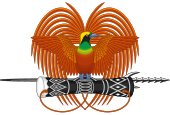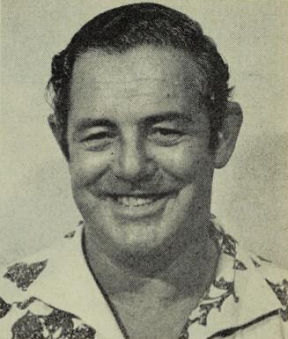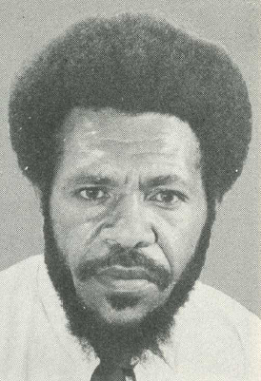 |
|---|
A by-election for Kaindi constituency was held in the Territory of Papua and New Guinea between 16 July and 15 August 1966. [1]
 |
|---|
A by-election for Kaindi constituency was held in the Territory of Papua and New Guinea between 16 July and 15 August 1966. [1]
In the 1964 general election, the Kaindi seat had been contested by nine candidates. Bill Bloomfield, having run a tactical campaign to earn voters' second preferences, was elected on the eighth count. [2] However, Bloomfield died in February 1966, becoming the first Papua New Guinean politician to die in office. [3]
Five candidates registered to contest the election: [1] [4]
Pacific Islands Monthly reported that the election was expected to be a contest between Omas-Genora and Voutas. [1]
90 polling stations were set up for the by-election, overseen by eight teams of electoral officials. [1] A total of 28,588 voters were registered. [5]
Voutas was elected on first preference votes, receiving 12,333 votes. Voter turnout was around 70%. [5]

Papua New Guinea elects on the national level a legislature. The National Parliament has 111 members, elected for a five-year term in single-seat constituencies. Papua New Guinea has a multi-party system, with numerous parties in which no one party often has a chance of gaining power alone, and parties must work with each other to form coalition governments. The first-past-the-post voting system was previously used, but in 2002 the limited Instant-runoff voting system was enacted into law and first used during the 2007 national election and 2008 local elections.

General elections were held in Fiji between 26 September and 8 October 1966, the last before independence in 1970 and the first held under universal suffrage. The result was a victory for the Alliance Party, which won 23 of the 34 elected seats. Its leader Kamisese Mara became the country's first Chief Minister the following year.

General elections were held in Papua New Guinea between 18 June and 9 July 1977, the first since independence from Australia in 1975. The Pangu Party led by Prime Minister Michael Somare emerged as the largest in the National Parliament. Somare subsequently formed a coalition government with the People's Progress Party (PPP) and several independent MPs. Voter turnout was 60.3%.

General elections were held in Papua New Guinea between 24 June and 8 July 2017. The writs for the election were issued on 20 April, and candidate nominations closed on 27 April.
This is a list of members of the House of Assembly of Papua and New Guinea from 1964 to 1968. The House of Assembly had of 34 open electorates, 10 electorates reserved for non-indigenous members and 10 official members. The non-official members had been elected at the 1964 election.

General elections were held in the Territory of Papua and New Guinea between 19 February and 11 March 1972. They saw the election of the country's first female MP, Josephine Abaijah.

General elections were held in Papua and New Guinea on 2 October 1954.

General elections were held in Papua and New Guinea on 31 August 1957.

General elections were held in Papua and New Guinea on 27 August 1960.

General elections were held in the Territory of Papua and New Guinea between 15 February and 15 March 1964. They were the first elections in the territory held under universal suffrage. Voter turnout among enrolled voters was 65%.

William John Bloomfield was an Australia-born Papua New Guinean politician. He served as a member of the House of Assembly between 1964 and his death in 1966.

General elections were held in the Territory of Papua and New Guinea between 17 February and 16 March 1968.

Ugi Biritu was a Papua New Guinean politician. He served as a member of the House of Assembly between 1964 and his death in 1967.

Donald Barrett was an Australian planter, army major, politician and sports coach in the Territory of Papua and New Guinea. He served as a member of the Legislative Council and House of Assembly in two spells between 1951 and 1968.

Atiheme Kimi was a Papua New Guinean politician. He served as a member of the House of Assembly between 1972 and 1973.

Awali Ungunaibe was a Papua New Guinean chief and politician. He served as a member of the House of Assembly between 1972 and 1975.
John Lester Chipper was an English-born Papua New Guinean businessman and politician. He served in the Legislative Council in two spells between 1959 and 1964 and headed the local council of Rabaul for several years.
Oala Oala-Rarua was a Papua New Guinean educator, civil servant, trade unionist, politician and diplomat. He served as a member of the House of Assembly and Assistant Minister for the Treasury between 1968 and 1972, later becoming the first Lord Mayor of Port Moresby and High Commissioner to Australia.

Buaki Singeri was a Papua New Guinean politician. He served as a member of the House of Assembly and National Parliament from 1972 until 1977.

General elections were held in Papua New Guinea from 4 to 22 July 2022 to elect the members of the National Parliament for a new five-year term.